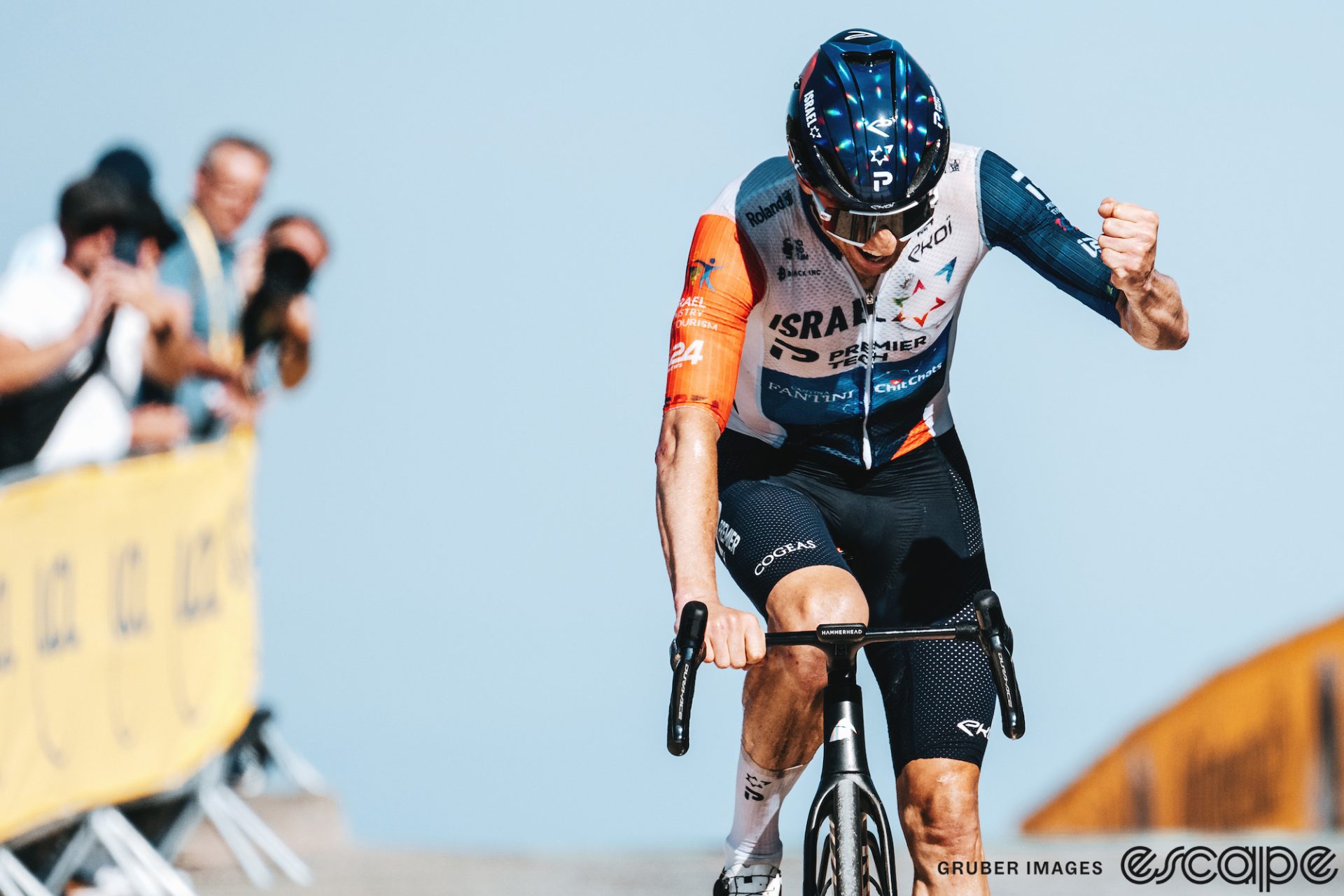Suppose we rewind a bit, before Mike Woods threw his arms up on the Puy de Dôme, before he caught poor Matteo Jorgensen in the final kilometer of a snail-shaped climb on the side of a volcano, before he jumped in a big break that was given more than 15 minutes. In that case, we get all the way back to his collapse on the Tourmalet. Not a literal collapse, but certainly a figurative one.
Woods came into this Tour de France with General Classification ambitions, intent on using his experience, a handy euphemism for being 36 years old, to ride into a high overall place. It wasn’t to be. Those ambitions were smashed against the slopes of the Pyrenees and Woods, like so many others in this challenging Tour, found himself 24 minutes down and hunting stages.
That’s fine. Great, even. You could argue that should have been the plan from the start, though who can blame him and his team for hoping to have their cake and eat it too?
How Woods ended up here, the winner of a Tour de France stage just days after suffering to the finish with a group of rouleurs on a mountain stage, is one of those tiny little anecdotes that indicates just how close to the edge these riders spend their three weeks in July.
We caught up briefly after Saturday’s sprint stage. Mads Pedersen had just taken his stage win, we were packed in the team busses, pushing fans out of the way as he rolled and I walked toward the Israel-Premier Tech bus. “I had a good start, then really was disappointed with the second two-day stint in the mountains,” Woods said. If the fitness was there, what happened? “I think I under-fueled during the easy days.”
This Tour has been unlike any other Grand Tour Woods has been part of. Unlike anything in modern Tour history, really. “I’ve never done a Grand Tour with this level of extremes, super hard first two days, then insanely easy, then super hard again,” Woods said. Those extremes lulled riders into a false sense of security of sorts. “I made the mistake of underfueling on those easy days,” Woods said. “It cost me when we went over the Tourmalet.” Cost him 23 minutes, to be exact.

Mistakes like that have a long tail; they can take days to pull out of. A few missed gels on a day that didn’t feel particularly hard, a rice cake that stayed in the pocket instead of downed for a rolling lunch; that’s all it takes. Glycogen stores deplete just a bit more than they should and when the going gets tough – when the going goes over the Tourmalet – there’s no hiding from the realities of depletion.
Three days later, Woods was topped up. Rice cakes galore across the Massif Centrale. He was free to roam, too, since nobody worries about a rider nearly half an hour away from yellow. He slipped into a 14-rider move that at one point was more than nine kilometers ahead of the peloton, and suddenly the stage win was down to just a handful of climbers and one audacious American who tried to pull one over on them all.
Woods didn’t play it quite right, though he didn’t play it wrong. Everybody was looking at him. He was the only legitimate GC contender in a group mostly made of rouleurs, strong men who could drive a move but would surely falter on the steep slopes of the Dôme.
“I knew I was probably the most marked man in that group,” he said. “I ended up not playing my cards super right, but I just had to be patient, then when I got four k to go, I didn’t think about going for the win I just thought about doing a time trial to the top.”
He needed to pull more than a minute back on Matteo Jorgensen. As the road got steeper and steeper, and the young American felt the full brunt of his 48-kilometer solo effort, Woods – almost 13 years his senior – slowly reeled him in. Under the flamme rouge, they were within the same wide camera shot. By 500 meters, the catch was made. Woods accelerated as he made the catch, ensuring Jorgensen wouldn’t get any ideas about following.
He was alone at the top. Muted cheers rang out from the fanless finish line; Tadej Pogačar’s parents and sister gave him a clap. He sat with French television. “I’m still having to pinch myself, I can’t believe I did it,” he said. “I’m really proud of myself, really proud of my team. It’s special.”
It was probably one of his last chances. Even the best careers don’t have many. He grabbed it. And the lesson, of course, is to always eat your rice cakes.
What did you think of this story?

